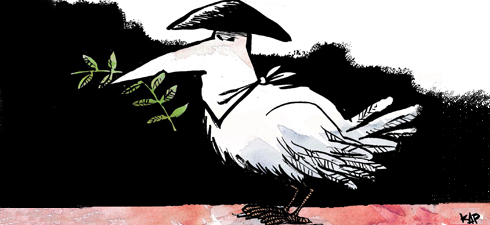Effective policing and the resilience of democracy have left ETA on the ropes. Underlining this point, if the group needed a pretext clad in solemnity to announce a definitive end to violence, yesterday they had it served up on a platter at the International Peace Conference on the Basque Country, held in San Sebastián.
The group of foreign dignitaries and mediators who gathered for the conference, the five-point statement that was issued and the absence of the Spanish and Basque governments should be enough to encourage the terrorists to declare a complete cessation of the violence as soon as possible. What's more, it's hard to imagine a framework to end the tragedy that could come any closer to what the Abertzale (the Basque term for an association of leftist nationalists) has insistently called for.
Although there will be no lack of those who will spy out surrenders in the approved text, the truth is that the appeal to the Spanish and French governments to negotiate - and for society in general to promote reconciliation with respect to the memory of the victims and their relatives - is something that has long been part of the script. Although even without the police and judicial prosecution the group had never been so close to throwing in the towel, this in itself will not enough to bring all these years of violence to an end.
Rajoy to oversee the end of ETA
Those who may persist in maintaining otherwise know that, at some point, something will have to be negotiated - not political concessions - for ETA to lay down its arms and vanish from the scene. To suppose that there can be nothing more conclusive than the submission of ETA is to ignore the history of other conflicts similar to that in the Basque country.
In fact, the conference of San Sebastian has taken on part of the strategy used to put an end to the violence in Ireland: there, no demand was made for the dissolution of the IRA, but only for an irreversible end to the violence. Later it was necessary to deal with the status of prisoners and to move forward with a political framework, and this will happen in the Basque Country too. It's something to keep in mind to prevent fundamentalisms from prevailing.
Given its party line, the absence of Spain's PP in this event is logical. But if, as it seems, it falls to the PP to oversee the end of ETA from its seat in government, it must act with high-mindedness and a willingness to compromise. The fact that Mariano Rajoy is considering managing the process hand in hand with the PSOE and PNV (Basque Nationalist Party) is a good sign.
Translated from the Spanish by Anton Baer
Opinion
“An insulting farce” for conservative press
It was “the festival of San Sebastián,” quips El Mundo, referring to the annual film festival held in the Basque town. The conservative daily considers the October 17 conference an “insulting farce” for those who believe in democracy - and especially for the victims of terrorism, “spreading”, as the conference does, “the absurd idea of a conflict between two camps, each enjoying the same moral legitimacy.”
The final declaration is a “trap”, adds El Mundo, which maintains that the “international stars” such as former UN Secretary-General Kofi Annan and former Irish Prime Minister Bertie Ahern “are serving the purposes of ETA”. The text “does not even call for the dissolution of the group or the handover of its arsenal,” the paper writes, “but merely for the cessation of violence”. What's more, it includes recognition for “all the victims”, which amounts to “a sly way of granting the status of victims to ETA members, thus erasing the lines between victims and their killers.”
The conservative daily also denounces the “silent complicity” of the Spanish government for consenting to a meeting at which the participants demand from it a solution “for what they call the 'last armed confrontation in Europe' that is both illegal and unconstitutional”. For El Mundo, “We must have faith that, once the new government is sworn in after November 20 [when Spain goes to the polls], this very bad movie premiered yesterday in San Sebastián will receive no accolades.”
Was this article useful? If so we are delighted!
It is freely available because we believe that the right to free and independent information is essential for democracy. But this right is not guaranteed forever, and independence comes at a cost. We need your support in order to continue publishing independent, multilingual news for all Europeans.
Discover our subscription offers and their exclusive benefits and become a member of our community now!












